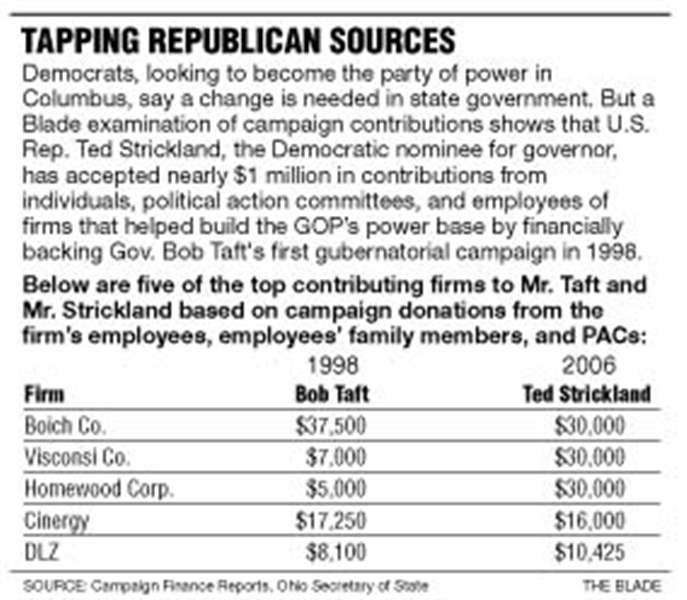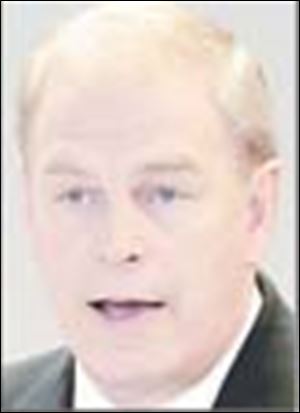
Strickland taps ex-backers of Taft for campaign cash
6/11/2006

Ted Strickland
COLUMBUS - Ohio Democrats, hoping to break the GOP's 16-year control over the governor's office, have pledged to crack down on "pay-to-play" - the trading of contracts for campaign contributions that Democrats say now permeates state government under Republican rule.
"There's a clear contrast between the Ohio Democratic Party and Ohio Republican Party in how we raise money, how we spend money, and the pay-to-play culture in Columbus," Ohio Democratic Party Chairman Chris Redfern told reporters on the day that Tom Noe pleaded guilty to federal campaign-finance violations.
But a Blade investigation of campaign contributions shows that Democrat Ted Strickland's campaign for governor is collecting money from many of the same individuals, political action committees, and employees of companies who have funded Republicans since the 1990s.
Mr. Strickland, a congressman who represents eastern and southeast Ohio, has accepted nearly $1 million in contributions from supporters of Gov. Bob Taft's first gubernatorial campaign in 1998 - the last time an incumbent wasn't in the race for governor, The Blade's review of campaign finance records shows.
The donors who supported Mr. Taft and now Mr. Strickland include government contractors, vendors, and lawyers seeking state legal work. The former Taft contributors have helped Mr. Strickland raise more than $6 million and gain a fund-raising advantage over Secretary of State Kenneth Blackwell, the Republican nominee for governor.
Some of the largest contributors who supported Mr. Taft and now support Mr. Strickland include Homewood Corp. founder and former Ohio State University Trustee George Skestos, who, along with family, has contributed $30,000 to Mr. Strickland and gave $5,000 to Mr. Taft in 1998. James Rogers, an elite fund-raiser for President Bush and the CEO of Cinergy Corp., has joined with his employees and company's PAC to contribute $16,000 to Mr. Strickland after backing Mr. Taft with $17,250 in 1998.
Executives from Boich Co., a traditional Republican supporter in the coal-mining business, have contributed $30,000 to Mr. Strickland's campaign after donating $37,500 toward Mr. Taft's first gubernatorial bid.
Employees of DLZ, a Columbus-based engineering and consulting firm that has received several Ohio Department of Transportation contracts, contributed $8,100 to Mr. Taft's campaign in 1998 and have given $10,425 to Mr. Strickland so far.

Several contributors to both Mr. Taft's campaign in 1998 and Mr. Strickland's campaign this year did not return phone messages.
Mr. Strickland, in an interview with The Blade last week, said he doesn't see any problem with his campaign raising money from former financiers of Mr. Taft - whose administration has been muddied by ethical missteps and allegations of influence-peddling.
"If anyone thinks they're going to give a contribution to Ted Strickland and have that in some way affect any official action I might take as governor, they are going to be in for a huge, huge disappointment," Mr. Strickland said.
"The system reflects the people who are in charge of it," Mr. Strickland said, referring to the investment scandal that has engulfed Mr. Taft's administration.
Last week, Terrence Gasper, the former chief financial officer of the Ohio Bureau of Workers' Compensation, who was hired when George Voinovich was governor, pleaded guilty to corruption charges and became the latest high-ranking public official or former public official to be convicted in the escalating scandal. Noe has pleaded not guilty to a 53-count indictment alleging he stole millions of dollars from the rare-coin funds he managed for the bureau.
In August, Mr. Taft was convicted on ethics charges after failing to disclose golf outings and gifts he received, including some from Noe. Four of Mr. Taft's former aides - all of them now lobbyists - also have been convicted for their dealings with Noe, a former GOP fund-raiser.
Mr. Strickland, after Mr. Taft's conviction last summer, said: "We've got corruption in Columbus that is unimaginable."
On the campaign trail, Mr. Strickland regularly speaks about what he calls the "out-and-out criminal behavior" by Mr. Taft and other GOP leaders as the Democrat calls for a leadership change.
Republicans - reacting to The Blade's findings that Mr. Strickland has taken nearly $1 million from contributors to Mr. Taft - say the Democratic candidate's rhetoric is hypocritical.
"He calls it pay-to-play for Republicans. If those same people are donating to him, what does that mean if Ted Strickland becomes governor?" said John McClelland, spokesman for the Ohio Republican Party. "Is it pay-to-play for him? He needs to either stop the pay-to-play talk or return all those contributions."
In addition to taking money from the people who propelled Mr. Taft to the governor's office, Mr. Strickland also has met with the controversial architect of the governor's career.
In April, Mr. Strickland attended an event hosted by Brian Hicks, Mr. Taft's former chief of staff who was convicted last year of failing to disclose vacation stays at Noe's Florida home on his annual ethics statement.
Mr. Strickland said the purpose of the one-hour meeting at the Capital Club in downtown Columbus was to talk with Mr. Hicks' lobbying clients. Mr. Strickland said he didn't know how the meeting was arranged.
Mr. Strickland said the event was not a fund-raiser, and he noted that last year he questioned whether Mr. Hicks should remain on the Ohio State University Board of Trustees after his misdemeanor ethics conviction.
Mr. Strickland has accepted at least $36,000 in contributions from Hicks Partners' clients and their clients' employees and PACs, campaign-finance records show.
Tim Hagan, a Democrat who ran for governor against Mr. Taft in 2002, said any effort by Democrats to meet with Mr. Hicks and his lobbying clients is "repugnant and disgusting."
"Politics is not just who wins and loses," Mr. Hagan said. "It's the impact you have on the people of this state."
He added, "That whole group ought to be run out of the state," referring to Mr. Taft and his former aides who have become lobbyists and consultants.
Mr. Hicks didn't return a message seeking comment.
During the 2002 election, Mr. Hagan, who lost by 21 percentage points and who raised only $1.5 million compared to Mr. Taft's $13 million, said he refused to take contributions from those who he thought were working against his political philosophy: "The utilities and the banks, the usual suspects."
"I couldn't be hypocritical about it," said Mr. Hagan, who is a Cuyahoga County commissioner.
But Mr. Hagan couldn't raise enough money to run TV ads. "I couldn't make the case, and you can't make the case in this state without money," Mr. Hagan said.
Mr. Strickland has accepted at least $58,000 from executives, employees, and PACs of energy companies and $14,500 from bankers who supported Mr. Taft in 1998.
Mr. Hagan said the contributions to Mr. Strickland from those who gave to Mr. Taft in 1998 don't necessarily mean Mr. Strickland "has sold his soul."
"When he's elected governor, people have every legitimate reason in the first and second years to ask the question: 'Were these people rewarded in the same way they were rewarded under Taft and [George] Voinovich?' " Mr. Hagan said.
Mr. Strickland said he has had extensive talks with his fund-raiser, former Ohio Democratic Party Chairman David Leland, about how there "should not be any connection between a campaign contribution I receive and any expectation of any kind of action taken on my part."
To Republicans, the allegations of corruption shouldn't have much meaning to voters if Democrats tap into the same fund-raising base they criticize.
"If that's the case" - that Democrats continue to cry foul about the sources of GOP campaign contributions - "then they should not take the money," said House Speaker Jon Husted, a Dayton-area Republican. "I think it's very hypocritical. If there is pay-to-play in state government and if the Democrats know about it, they should contact law enforcement. I think what they would rather do is allege it happens and then set up their own shop to do everything they've complained about."
"You can't criticize people out of one side of your mouth for taking campaign contributions at the same time you're sticking the checks from the same people in your own back pocket," Mr. Husted said.
In the primary campaign, Mr. Blackwell criticized Attorney General Jim Petro, his Republican opponent, for being "Taftlike." Now Mr. Blackwell's campaign, which Mr. Taft has endorsed, says Mr. Strickland, a Democrat, would be worse than Mr. Taft.
"It's just more of the same for Ted Strickland," said Carlo LoParo, Mr. Blackwell's press secretary. "He says he's going to be different, but he's not. If he were just straight about who he is, he would not have a problem."
Mr. LoParo said if Mr. Strickland is elected, Ohioans would not see major changes in how state government is run.
David Milenthal, a communications consultant who is an unpaid adviser to Mr. Strickland's campaign, said Mr. Strickland is getting a lot of campaign money from Republican donors because "this is not a Republican vs. Democratic campaign."
Mr. Blackwell "operates at the extremes," and Mr. Strickland is "part of the mainstream," said Mr. Milenthal, whose firm worked on a 2002 campaign led by Republican Larry Householder, then the House speaker, and Akron charter school magnate David Brennan to elect GOP Supreme Court candidates.
The day after the May primary election, Paul Tipps, a former lobbyist and chairman of the Ohio Democratic Party, complained at a forum in Columbus that "the name of the game is win at any costs. And the cost is the taxpayer dollars."
Mr. Tipps, referring to the GOP control over all branches of state government, told lobbyists and Statehouse insiders: "What we have in Ohio now is good people doing bad things and rationalizing it because it is good politics."
Neil Clark, a powerful Republican lobbyist who teamed up with Mr. Tipps for several years, said GOP candidates must come forward with plans to change the system and separate themselves from Mr. Taft.
"Ken Blackwell constantly said, "I'm not Taft,' " Mr. Clark said. "They have to come back with immediate reforms in my opinion to correct things."
Democrats and Mr. Taft have introduced proposals for campaign-finance and procurement reform, but the GOP-controlled General Assembly has not addressed the issue.
Mr. Husted, the House speaker, said GOP lawmakers are examining proposals to revise the laws governing state contracting, which he said is "where the trouble has come from."
"You don't want one person to have the authority to make these decisions in awarding contracts without making sure there are checks and balance," he said.
Mr. Strickland said he would hire administrators who "see public service as a way to serve and not to benefit and advance themselves" and punish "those who violate the public trust."
In February, Mr. Petro called for a ban on state contracts for contributors.
Mr. Strickland, though, did not have a position on Mr. Petro's proposal. "We do hope to have a clearly defined set of ethical standards that we will make available at a later time," Mr. Strickland said.
Contact Steve Eder at: seder@thelade.com or 419-724-6272.